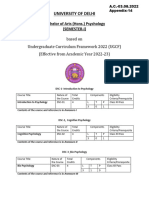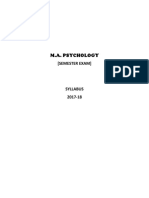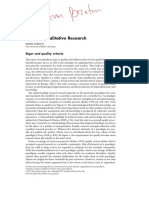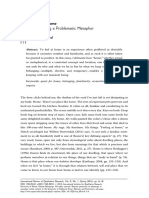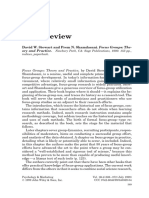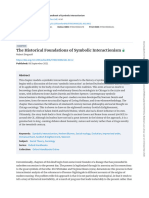Syllabus for
M.A. / M.Sc. in Psychology
University of Calcutta
2024
1
�SEMESTER 1
MODULE COURSE MARKS CREDIT
1 Core Course 1 Cognitive Psychology 50 4
2 Core Course 2 Quantitative Research Methods in Psychology 50 4
3 Core Course 3 Qualitative Research Methods in Psychology 50 4
4 Core Course 4 Practical I 50 4
5 Core Course 5 Practical II 50 4
TOTAL 250 20
SEMESTER 2
MODU COURSE MARKS CREDIT
LE
6 Core Course 6 Behaviour & Biology 50 4
7 Core Course 7 Developmental theories and Personality 50 4
8 Core Course 8 Social and Cultural Psychology 50 4
9 Core Course 9 Practical III 50 4
10 Core Course 10 Practical IV 50 4
TOTAL 250 20
SEMSETER 3
MODULE COURSE MARKS CREDIT
11 Core Course 11 Clinical Psychology 50 4
12 Core Course 12 Positive Psychology 50 4
13 Elective Course (ONE OUT OF THREE) 50 4
(Practical)
EC 1.1 Clinical Psychology Special Practical I
EC 1.2 Social Psychology Special Practical I
EC 1.3 Research Methodology and Data Analysis
Special Practical I
14 Course 14 CBCC Interdisciplinary course as per University 50 4
A: Psychology rules
15 Course 15 CBCC Interdisciplinary course as per University 50 4
B rules
TOTAL 250 20
SEMESTER 3 (INTERDISCIPLINARY) CBCC
Course to be offered for students from other departments
COURSE MARKS CREDIT
CBCC Psychology 50 4
2
�SEMESTER 4
MODULE COURSE MARKS CREDIT
16 Elective Course (ONE OUT OF THREE) 50 4
(Practical)
EC 2.1 Clinical Psychology Special Practical II
EC 2.2 Social Psychology Special Practical II
EC 2.3 Research Methodology and Data Analysis
Special Practical II
17 Elective Course (ONE OUT OF THREE) 50 4
(Theory)
EC 3.1 Special Theory Clinical I: Psychotherapy
EC 3.2 Special Theory Social I: Critical Psychology
and Psychology of Gender
EC 3.3 Special Theory I - Research Methodology and
Data Analysis
18 Core Course 13 Internship/ Dissertation (as per choice of 50 4
students) [This paper is independent of
Elective Special Course]
19 Elective Course (ONE OUT OF THREE) 50 4
(Theory)
EC 4.1 Special Theory Clinical II - Health Psychology
& Neuropsychology
EC 4.2 Special Theory Social II - Psychology of
Power and Peace
EC 4.3 Special Theory II - Research Methodology &
Data Analysis
20 Elective Course (ONE OUT OF THREE) 50 4
(Theory)
EC 5.1 Special Clinical Theory III - Forensic
Psychology
EC 5.2 Special Theory Social III - Social
Psychological Issues in Community
EC 5.3 Special Theory III - Research Methodology &
Data Analysis
TOTAL 250 20
3
�Detailed Syllabus
SEMESTER I
CC1: Cognitive Psychology
Attention (Theories of Attention - Selection, Resource Allocation, Divided Attention,
Early versus Late models of attentions - debate, Cueing experiments, Selective set
versus selective filtering experiments)
Memory (Models of memory; Working memory)
Signal detection
Linguistics
Deception
Imagery
List of selected books:
Best, J.B. (1989). Cognitive Psychology, Second Edition, West Publishing Company,
New York.
Galotti, K.M. (2008). Cognitive Psychology: In and out of the laboratory (2nd Ed.).
Bangalore: Wadsworth, Cengage Learning India Private Limited.
Matlin, M.W. (2014). Cognition (8th Edition). Delhi: Pearson.
Solso, R.L. (2004). Cognitive Psychology, Sixth Edition. Pearson Education Pvt. Ltd.,
New Delhi.
Sternberg, R.J. (2009). Applied Cognitive Psychology: Perceiving, Learning and
Remembering. Delhi: Cengage Learning India Private Limited.
CC2: Quantitative Research Methods in Psychology
Research designs
Analysis & interpretation of nominal data
Non-parametric statistics
Steps of inferential statistics
Factorial ANOVA
List of selected books:
Bryman, A. (2004). Quantity and Quality in Social Research: Routledge.
Dyer, C. (2001). Research in Psychology: A Practical Guide to Research Methodology
and Statistics (2nd ed.), Oxford: Blackwell Publishers.
4
� Kerlinger, F.N., and Lee, H.B. (1999). Foundations of Behavioural Research.
Wadsworth.
Guilford, J.P. and Fruchter (1989). Statistics in Psychology & Education. McGraw
Hills.
Broota, K.D. (1992). Experimental design in behavioural research. New Delhi: Wiley
Eastern.
CC3: Qualitative Research Methods in Psychology
Historical moments, ethical issues, trustworthiness
Sampling
Methods of data generation
Construction of semi-structured interview and data generation
List of selected books:
Flick, U. (Ed.) (2014). The Sage Handbook of Qualitative Data Analysis. Sage, Los
Angeles.
Czrniawska, B. (2004). Narratives in Social Science Research. New Delhi: Sage.
Denzin, N.K., and Lincoln, Y.S. (Latest edition). Handbook of qualitative research.
Thousand Oaks: Sage
Mason, J. (2018). Qualitative Researching. Third edition. Sage, Los Angeles.
Bailey, C.A. (2018). A guide to qualitative field research. Third edition. Sage, Los
Angeles.
Boreus, K. and Bergstrom, G. (2017). Analyzing text and discourse: Eight approaches
for the social sciences. Sage, Los Angeles.
Gobo, G. (2008). Doing ethnography. Los Angeles: Sage.
Riecoeur, P. (2004). The conflict of Interpretations. London: Continuum.
Silverman, D. (2000). Doing qualitative research – A practical handbook. Thousand
Oaks: Sage.
Smith, J.A. (2008). Qualitative Psychology: A Practical Guide to Research Methods.
London: Sage.
Srivastava, V.K. (2004). Methodology and Fieldwork. New Delhi: Oxford.
5
�CC4: Practical I
Experimentation - laboratory experiment (attention / memory / decision making)
Field experiment (social influence)
CC5: Practical II
Cognitive assessment - WAIS, PGI - memory, Trail making, N back test
SEMESTER II
CC6: Behaviour and Biology
Evolution of human brain - theories, social brain hypothesis
Genetic basis of behaviour and disorders
Endocrine and neurotransmitter systems in relation to cognition, behaviour, stress
Lobe functions
Assessment - ERP, Biofeedback, neuropsychological aspect of WAIS and BGT
List of selected books:
Kim, Y-K. (Ed.) (2009). Handbook of Behaviour Genetics. Springer.
Guyton, A.C., and Hall, J.E. (2011). Textbook of Medical Physiology. Twelfth Edition.
Elsevier: Philadelphia.
Mills, K.R. (Eds.) (2016). Oxford Textbook of Clinical Neurophysiology. Oxford
University Press. London.
CC7: Developmental theories and Personality
Piaget, Vygotsky & Kohlberg - advanced perspectives
Ageing & its psycho-social correlates
Seminal Paper on Freud, Theories of personality - Jung, Adler, Klein, Mahler, Dollard-
Miller, Kelly, Rollo May & Frankl
List of selected books:
Feldman (2010). Discovering the Lifespan. New Delhi: Pearson Education, Inc.
Harris, M. (1998). Exploring developmental psychology: Understanding theory and
methods. New Delhi: Sage Publications.
6
� Mitchell, P. and Ziegler, F. (2007). Fundamentals of development: The Psychology of
Childhood. New York: Psychology Press.
Preitler, B. (2015). Grief and Disappearance: Psychosocial Interventions. Sage: Los
Angeles.
Sharma, K.L. (Ed.) (2007). Studies in Gerontology: Intergenerational perspectives.
Rawat Publications. Jaipur.
Sigelman, G.K., & Schaffer, D.R. (1995). Life-span human development. Brooks/ Cole
Publishing Co. Pacific Grove, California.
Schroeder, C.S. and Gordon, B.N. (2002). Assessment and treatment of childhood
problems: A clinician’s guide, 2nd edition, The Guilford Press, New York.
Arockiasamy, A. (2005). Personality Psychology. Thanjavur: Aranya Publishers.
Feist, J., Feist, G.L. and Roberts, T-A. (2018). (Indian Edition). Theories of Personality.
McGraw Hill Education (India) Private Limited.
Hall, C.S. and Lindzey, G. (1978). Theories of Personality, 3rd edition New York, John
Wiley.
Hhelle, L.A. and Ziegler (1981). Personality theories: Basic assumptions research and
applications, Singapore, McGraw Hill.
Ryckman, R.M. (1993). Theories of Personality (5th edition). Pacific Grove, California,
Brooks/ Cole Publishing Company.
CC8: Social and Cultural Psychology
Social Identity Theory, Fromm's Theory, Symbolic Interactionism
Theories of stigma
Theories of Aggression
Identity and Culture - enculturation, acculturation
Indigenous theories, folk psychology
List of selected books:
Fiske, S.T., Gilbert, D.T., and Lindzey, G. (Eds.). (2010). Handbook of Social
Psychology, 5th Edition. Wiley & Co.
Gilbert, D.T., Fiske, S.T., and Lindzey, G. (1998). The Handbook of Social Psychology.
McGraw-Hill.
Cohen, D. and Kitayama, S. (2020). Handbook of Cultural Psychology. Guilford Press.
Fromm, E. (1995) [1956]. The art of loving. Thorsons: Dublin.
Goffman, E. (1963). Stigma: Notes on the Management of Spoiled Identity. New York:
Simon & Schuster.
7
�CC9: Practical III
Personality Assessment - EPQ, 16PF, Rorschach, TAT
CC10: Practical IV
Qualitative method - Interview including Narrative Interview and Focus Group
Discussion
SEMESTER III
CC11: Clinical Psychology
Classification of Psychiatric disorders - ICD and DSM
Clinical features of - Schizophrenia, Mood Disorder (Bipolar Affective Disorder,
Depression), Generalised Anxiety Disorder, Phobia, OCD, Dissociative Disorder
Overview of Personality Disorders - Borderline, Antisocial, Anankastic
List of selected books:
Boland, R., Verduin, M., and Ruiz, P. (2022). Kaplan & Sadock’s Synopsis of
Psychiatry. 12 th Edition. Wolters Kluver. Philadelphia.
Mueser, K.T. and Jeste, D.V. (Eds.) (2008). Clinical Handbook of Schizophrenia. The
Guilford Press, New York.
DeRubeis, R.J. and Strunk, D.R. (Eds.). (2015). The Oxford Handbook of Mood
Disorders. Oxford University Press, London.
Antony, M.M. and Stein, M.B. (Eds.). (2008). Oxford Handbook of Anxiety and
Related Disorders. Oxford University Press. London.
Millon, T., Grossman, S., Millon, C., Meagher, S., and Ramnath, R. (2004). Personality
disorders in modern life. John Wiley & Sons, Inc., New Jersey.
CC12: Positive Psychology
Introduction to Positive Psychology;
Strength-based development - Forgiveness, Humour, Happiness, Gratitude, Silence,
Authenticity, Resilience, Hope,
Positive being and growth - Mindfulness, Yogic philosophy, Meditation, Buddhist
philosophy
List of selected books:
Snyder, C.R., and Lopez, S.J. (Eds.) (2002). Handbook of Positive Psychology, Oxford
University Press.
8
� Snyder, C.R. (Ed.) (2000). Handbook of hope: Theory, measures and applications.
Academic Press: Santiago.
Hanh, T. N. (1987). The miracle of mindfulness: An introduction to the practice of
meditation. Beacon Press, Boston.
Sim, S. (2007). Manifesto for silence: Confronting the Politics and culture of noise.
Edinburgh University Press.
Wong, P.T.P., McDonald, and D. Klaassen (Eds). (2007). The positive psychology of
meaning and spirituality. Abbotsford, BC: INPM Press.
Lopez, S. and Snyder, C.R. (Eds.). Handbook of positive psychology assessment.
Washington, DC: American Psychological Association.
Vivekananda. S. (Latest edition). Samagra Yoga. Udbodhon Karyalaya.
EC 1.1 Clinical Psychology Special Practical I
Case history, MSE / Behavioural observations, Psychometric assessment
EC 1.2 Social Psychology Special Practical I
Using appropriate method (Quantitative / qualitative/ mixed) - Self and Social identity
/ Implicit Attitude / Deception / Media
EC 1.3 Research Methodology and Data Analysis Special Practical I
Sampling and data analysis in qualitative research; Research design, sampling design
and data analysis in quantitative research
CBCC-A: Psychology
Cognitive processes (attention and memory)
Affective processes (emotion and motivation)
Personality (Freud, Jung, Erikson, Maslow)
Neuropsychological basis of behaviour
List of selected books:
Matlin, M.W. (2014). Cognition (8th Edition). Delhi: Pearson.
Solso, R.L. (2004). Cognitive Psychology, Sixth Edition. Pearson Education Pvt. Ltd.,
New Delhi.
Feist, J., Feist, G.L. and Roberts, T-A. (2018). (Indian Edition). Theories of Personality.
McGraw Hill Education (India) Private Limited.
9
� Hall, C.S. and Lindzey, G. (1978). Theories of Personality, 3rd edition New York, John
Wiley.
Levinthal, C.F. (1983). Introduction to Physiological Psychology. Prentice-Hall,
Englewood Cliffs, N.J.
Module 14 & 15 – CBCC- A & B- Courses will be taken from other departments
SEMESTER IV
EC 2.1 Clinical Psychology Special Practical II
Case history, MSE / Behavioural observations, Psychometric assessment
EC 2.2 Social Psychology Special Practical II
Ethnography / Life History
EC 2.3 Research Methodology and Data Analysis Special Practical II
Apriori inferential statistics (repeated measure and mixed design ANOVA, ANCOVA,
MANOVA and MANCOVA) and post-hoc analysis (Tukey, Duncan, Newman,
Bonferroni)
Prediction statistics: Multiple regression analysis (step-wise and hierarchical)
Logistic regression
Path analysis: Concept and computations using software
Dimensionality reduction techniques: Exploratory Factor analysis, Principal
component analysis, Maximum likelihood method, Confirmatory Factor analysis,
Independent component analysis, Concept and computations using software.
Classification techniques - cluster analysis, discriminant function analysis
List of selected books:
Broota, K.D. (1992). Experimental design in behavioural research. New Delhi: Wiley
Eastern.
Field, A. (2019). Discovering Statistics using IBM SPSS Statistics. Sage Publications
Ltd.
Dillon, W.R. & Goldstein, M. (1984). Multivariate analysis: Methods & Applications.
John Wiley & Sons: USA.
10
� Dyer, C. (2001). Research in Psychology: A Practical Guide to Research Methodology
and Statistics (2nd Ed.) Oxford: Blackwell Publishers.
Guilford, J.P. and Fruchter (1989). Statistics in Psychology & Education. McGraw
Hills.
Siegal, S. (2002). Non-parametric statistics for the behavioural sciences. New Delhi:
Tata McGraw Hill.
Siegal, S., and Castellan, N.J. (1988). Non-parametric Statistics. McGraw Hill.
EC 3.1 Special Theory Clinical I: Psychotherapy
Different approaches of psychotherapeutic intervention - Supportive, Re-educative,
Reconstructive;
Different methods of psychotherapeutic intervention - Psychoanalysis, Client-centred
therapy, Cognitive-behavioural therapy, Behavioural therapy, Existential therapy
Factors contributing to response in psychotherapy and other critical issues,
Research in Psychotherapy
List of selected books:
Hersen, M., Sledge, W. (Eds.) (2002). Encyclopaedia of Psychotherapy. Elsevier
Science Ltd.
Wolberg, L.R. (1995). The technique of psychotherapy. Jason Aronson Inc. Publishers.
Dryden, W. (Ed.) (1996). Developments in Psychotherapy: Historical Perspectives.
Sage: London.
Frankl, V.E. (1984). Man’s search for meaning (Rev. ed.) New York: Washington
Square Press/ Pocket Books.
EC 3.2 Special Theory Social I: Critical Psychology and Psychology of Gender
Critical Psychology: Introduction; critical social issues - caste, class, gender, disability,
displacement
Politics of madness, Social justice
Feminist theories and queer theory
Psychology of men and masculinity
List of selected books:
Fox, D., Prilleltensky, I. and A., S. (2009). Critical Psychology: An Introduction. Sage
Publications Inc.
11
�EC 3.3 Special Theory I: Research Methodology and Data Analysis
Quantitative and Qualitative research methodology - Critical review writing
APA guidelines for report writing
Concept of meta-analysis
List of selected books:
Field, A. (2019). Discovering Statistics using IBM SPSS Statistics. Sage Publications
Ltd.
Dillon, W.R. & Goldstein, M. (1984). Multivariate analysis: Methods & Applications.
John Wiley & Sons: USA.
Dyer, C. (2001). Research in Psychology: A practical Guide to Research Methodology
and Statistics (2nd Ed.) Oxford: Blackwell Publishers.
Guilford, J.P. and Fruchter (1989). Statistics in Psychology & Education. McGraw
Hills.
CC13: Internship/ Dissertation (as per choice of students) [This paper is independent of
Elective Special Course]
EC 4.1 Special Theory Clinical II - Health Psychology & Neuropsychology
Diathesis, coping, illness behaviour
Grief, death anxiety; Stress related disorders - CVD, IBS, Diabetes, Obesity
Neuropsychology - overview, language network, memory - emotion network
Neurocognitive disorders - Epilepsy, Alzheimer’s & Fronto-temporal dementia
List of selected books:
Cooper, C.L., and Quick, J.C. (Eds.) (2017). The Handbook of Stress and Health: A
Guide to Research and Practice. John Wiley & Sons Ltd.
Cheryl D. Conrad, C.D. (Ed.) (2011). The Handbook of Stress: Neuropsychological
effects on the brain. Blackwell Publishing Ltd.
Preitler, B. (2015). Grief and Disappearance: Psychosocial Interventions. Sage: Los
Angeles.
Harkness, K.L., and Hayden, E.P. (Eds.) (2018). The Oxford Handbook of Stress and
Mental Health. Oxford University Press.
12
�EC 4.2 Special Theory Social II - Psychology of Power and Peace
Authoritarianism
Foucault's analysis of power
Terrorism
Peace and Spirituality
List of selected books:
MacNair, R.M. (2011). The Psychology of Peace: An Introduction. Westport, CT.
Adorno, T., Else, F-B; Levinson, D., Sanford, N. (1993) [1950]. The Authoritarian
Personality. Studies in Prejudice Series. Vol. 1. New York City: Harper & Row and W.
W. Norton & Company.
Mogaddam,F. (2006). From the Terrorists' Point of View: What They Experience and
Why They Come to Destroy. Praeger Security International.
W. G. K. Stritzke, S. Lewandowsky, D. Denemark, J. Clare, & F. Morgan (Eds.) (2009).
Terrorism and torture: An interdisciplinary perspective (pp. 106–124). Cambridge
University Press.
Culliford, L. (2011). The Psychology of Spirituality. Jessica Kingsley Publishers
EC 4.3 Special Theory II: Research Methodology & Data Analysis
Advanced Qualitative Method - Participatory Action Research, Archival research, Oral history
EC 5.1 Special Clinical Theory III - Forensic Psychology
Definition of Forensic Psychology, guidelines for forensic psychology for
psychologists; Role of forensic psychologist; Biopsychosocial perspectives
Child custody & evaluation (parental evaluation considering best interest of child), role
of collateral information; evidences
Crowd scanning & identification of subject - BOSS & SETS; Facial recognition
cameras; facial recognition glasses, surveillance cameras with facial recognition
technology that with enable police to identify wanted snapset in a crowd, TTI (Tell Tale
Indicator)
Criminal behaviour profiling - case history, interview, MSE; psychological tests'
application to forensics, Neuropsychological tests' application to forensics, special
scales/ measures; competence to stand trials, give evidence; techniques for assessment
- polygraph, BEOS, Hypnosis, Narco-interview, SDS, Polygraph, BEOS, Suspect
detection system, crime profiling/ writing report
Forensic Psychological Rehabilitation - risk-need responsivity model, good lives
model, therapeutic jurisprudence model, human rights and normative; rehabilitation of
offenders - case presentation
List of selected books:
13
� McLaughlin, E., and Newburn, T. (Eds.) (2013). The Sage Handbook of Criminological
Theory. Sage: Los Angeles.
Williams, K.S. (2004). Textbook on Criminology, 5th edition. Oxford University Press.
Brown, J., and Campbell, E. (2010). The Cambridge Handbook of Forensic Psychology.
Cambridge: Cambridge University Press.
Kapardis, A. (2009). Psychology and Law: A critical introduction. Cambridge:
Cambridge University Press.
Sheldon, K., Davies, J., and Howells, K. (Eds.) (2011). Research in Practice for
Forensic Professionals. Abingdon: Routledge.
Sturmey, P., and McMurran, M. (2011). Forensic Case Formulation. Chichester: Wiley.
EC 5.2 Special Theory Social III - Social Psychological Issues in Community
Community Psychology: Journey in the global context, Issues. Values & tools for
liberation and wellbeing, Ecology, Prevention, Promotion.
Community & Power. Commitment, accountability, inclusion.
Community Psychology intervention: Social, Organizational, Small group, Individual
level, Marginalization, Globalization Power & Social justice, Colonization & Racism,
Immigration and adaptation, Disadvantaged children & family
Environmental issues. Future of Community Psychology.
List of selected books:
Nelson, G. & Prillentensky, I. (Eds.) (2010). Community Psychology: In pursuit of
liberation and well-being. Palgrave Macmillon.
EC 5.3 Special Theory III - Research Methodology & Data Analysis
Sample size determination and G* power analysis; Survival analysis; Missing value
analysis;
Bootstrapping; Steps of diagnostic and psychometric tool construction.
Bibliometric analysis, Systematic Review and meta-analysis
Partial least square, structural equation modelling, Covariate-based structural equation
modelling.
Reflexivity and allied uses in qualitative method
List of selected books:
Field, A. (2019). Discovering Statistics using IBM SPSS Statistics. Sage Publications
Ltd.
Broota, K.D. (1992). Experimental design in behavioural research. New Delhi: Wiley
Eastern.
14
� Dillon, W.R. & Goldstein, M. (1984). Multivariate analysis: Methods & Applications.
John Wiley & Sons: USA.
Dyer, C. (2001). Research in Psychology: A practical Guide to Research Methodology
and Statistics (2nd Ed.) Oxford: Blackwell Publishers.
Guilford, J.P. and Fruchter (1989). Statistics in Psychology & Education. McGraw
Hills.
Siegal, S. (2002). Non-parametric statistics for the behavioural sciences. New Delhi:
Tata McGraw Hill.
Siegal, S., and Castellan, N.J. (1988). Non-parametric Statistics. McGraw Hill.
Denzin, N.K., and Lincoln, Y.S. (Latest edition). Handbook of qualitative research.
Thousand Oaks: Sage
Bailey, C.A. (2018). A guide to qualitative field research. Third edition. Sage, Los
Angeles.
Boreus, K. and Bergstrom, G. (2017). Analyzing text and discourse: Eight approaches
for the social sciences. Sage, Los Angeles.
Gobo, G. (2008). Doing ethnography. Los Angeles: Sage.
Silverman, D. (2000). Doing qualitative research – A practical handbook. Thousand
Oaks: Sage.
Smith, J.A. (2008). Qualitative Psychology: A Practical Guide to Research Methods.
London: Sage.
15









































